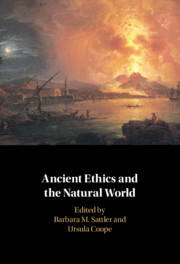Book contents
- Ancient Ethics and the Natural World
- Ancient Ethics and the Natural World
- Copyright page
- Dedication
- Contents
- Contributors
- Note on the Editors
- Introduction
- Part I Humans in Nature: Nature and Law, Humans and Natural Catastrophes
- Part II Humans as Godlike, Gods as Humanlike: Presocratics and Platonists
- Part III Emotions, Reason, and the Natural World (Aristotle)
- Chapter 6 Human and Animal Emotions in Aristotle
- Chapter 7 Reasonable and Unreasonable Affections and Human Nature
- Part IV Action and the Natural World (Aristotle)
- Part V The Naturalness of Goodness
- Bibliography
- Index Locorum
- General Index
Chapter 7 - Reasonable and Unreasonable Affections and Human Nature
from Part III - Emotions, Reason, and the Natural World (Aristotle)
Published online by Cambridge University Press: 13 August 2021
- Ancient Ethics and the Natural World
- Ancient Ethics and the Natural World
- Copyright page
- Dedication
- Contents
- Contributors
- Note on the Editors
- Introduction
- Part I Humans in Nature: Nature and Law, Humans and Natural Catastrophes
- Part II Humans as Godlike, Gods as Humanlike: Presocratics and Platonists
- Part III Emotions, Reason, and the Natural World (Aristotle)
- Chapter 6 Human and Animal Emotions in Aristotle
- Chapter 7 Reasonable and Unreasonable Affections and Human Nature
- Part IV Action and the Natural World (Aristotle)
- Part V The Naturalness of Goodness
- Bibliography
- Index Locorum
- General Index
Summary
According to Aristotle there is an important distinction between human beings and the rest of nature: while all other creatures develop as they do ‘necessarily or for the most part’, the development of human beings depends on their own efforts. This applies not only to their acquisition of technical and intellectual accomplishments, but to their character as well. Emotions or affections (pathē) play an important role in that development; they have an interesting ‘passive-cum-active’ character. Although their experience is not determined by choice, it is due to understanding and evaluating the particular situation. Reasoning is therefore in a way involved in the formation of human affections by habituation. The process of habituation determines not only how human beings act, but also how they feel. The affective part of the soul, though it is non-rational, is capable of ‘listening’ to reason more or less well and thereby the person acquires good or bad dispositions to act. Thus, in a human being, affections can be reasonable or unreasonable: The distinctive reason-responsiveness of the affections helps to explain why, despite certain natural predispositions, successful human development cannot simply be attributed to nature.
Keywords
- Type
- Chapter
- Information
- Ancient Ethics and the Natural World , pp. 125 - 144Publisher: Cambridge University PressPrint publication year: 2021



